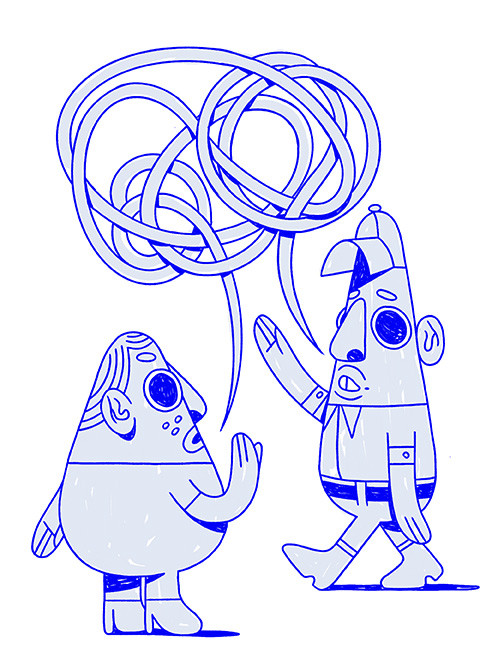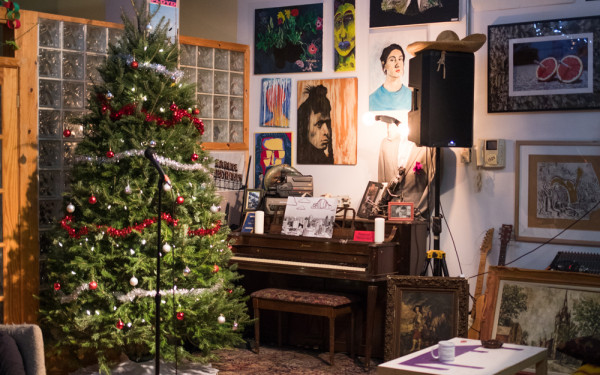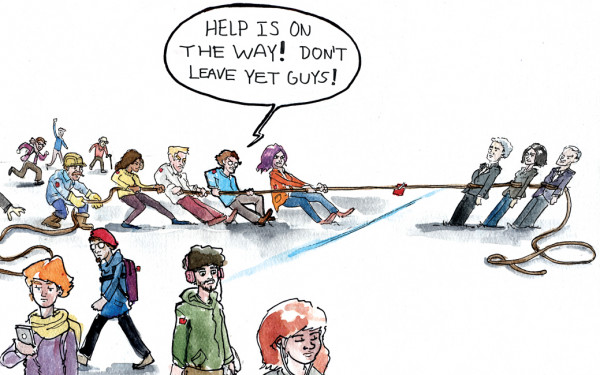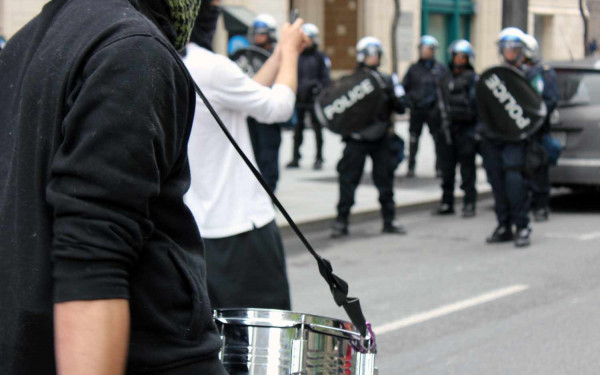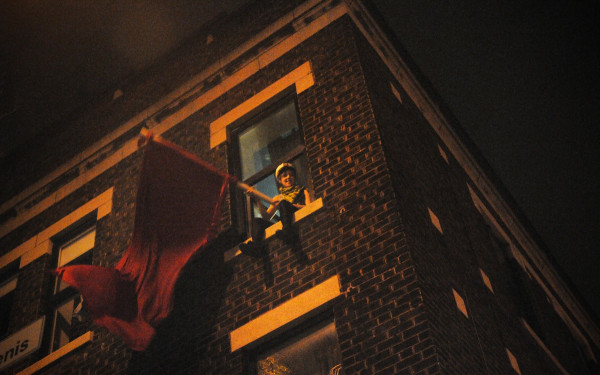In Montreal, we speak franglais
How a mélange of French and English gives rise to a unique cultural language
“Let’s grab some beer at the dep” or “J'trouve pas d’parking” will probably become your préférées “Frenglish” expressions as you will often hear them in the city.
The food—particulièrement our poutine adorée, bagels, and Schwartz's smoked meat sandwiches—and multiculturalism are part of Montreal’s vibe.
Montreal is one of the cities in Canada where Frenglish, or, in French, le franglais, is spoken. This mix of French and English words is how Montrealers have come to adapt in an environment where these two languages coexist—and maybe to show off a little.
Like many Montrealers, Clyde Boucher uses Frenglish on a daily basis to communicate with his friends and family. The 22-year-old Notre-Dame-de-Grâce native has used this dialect since elementary school.
“Some of [the students] were already mixing French and English in their speech, so I gradually picked that up,” he explained.
Growing up in a French-speaking household, Boucher had to learn English at school. Although his classes were in French, most of his classmates and friends were anglophone.
For him, Frenglish is a big part of his life, and he does not see himself going without it.
“It comes to me so naturally without even thinking twice about it. [...] [I]t is second nature for me,” said Boucher.
“Even if you don’t speak a word of French, most chances are that you will still understand what we say,” he added.
Montrealers will often say that they speak Frenglish without even noticing. This language is born out of a culture influenced by the presence of French and English groups within the same city.
Bilingualism in Montreal
Montreal owes its language dynamic to its colonial history of language contact between the French and English communities. Canada’s large English-speaking population has influenced Quebec French to add some English words into the language and vice versa.
Although French is the primary language of Montreal with 57 per cent of the population speaking it at home, Montreal is one of the most bilingual cities in Canada. In fact, more than half of the city’s population is bilingual.
English-French bilingualism in Quebec has continued to rise over the past decade. According to the 2016 census results, bilingualism doubled in Quebec from 25.5 per cent in 1961 to 44.5 per cent in 2016.
A way to observe this linguistic mosaic in Montreal is to visit the different neighborhoods in the city. You will find that French is more dominant in Montreal’s east end—which is composed of the arrondissements of Rivière-des-Prairies-Pointes-aux-Trembles, Anjou, and Montreal East—whereas the western part of the city is more anglophone. Known as the West Island, these lovely neighborhoods include Kirkland, Pierrefonds, Dollard-des-Ormeaux, Pointe-Claire, and Saint-Anne-de-Bellevue.
Sometimes, Boucher will feel like choosing a language over the other to express certain words because they make more sense in that language.
Many Montrealers also feel that way. Jean-Marc Augustave was born in Ahuntsic-Cartierville, moved to Saint-Laurent when he was seven and is now living in Laval. Unlike Boucher, Augustave grew up in a bilingual household. With both of his parents being from Haiti, Augustave has been mixing French and English from a young age. “I definitely learned Frenglish from my parents,” said Augustave.
St-Laurent borough—one of the most multicultural ones in Montreal with 81 per cent of its residents being first or second generation immigrants—is where Augustave learned the linguistic influences in Montreal. For him, speaking this one-of-a-kind language made him who he is today.
“It’s deeper than just mixing English and French in one sentence, it’s about sharing different cultures and mindsets,” he added. “But mostly, it is about having a unique identity as a city that’s multicultural.”
Code-switching: The real term to define Frenglish
Although most Montrealers define this linguistic mosaic of switching from a language to another as “Frenglish,” in more academic circles, it is known as “code-switching.”
Code-switching refers to the use of two or more languages in a single conversation.
For Olivier Brosseau-Côté, a master’s student in linguistics, the use of code-switching among Montrealers shows that they have acquired two linguistic systems and are comfortable enough to switch from one language to another.
Code-switching can be used for multiple reasons. Some people might code-switch to make themselves better understood, to express certain feelings or to demonstrate the ability to speak two languages.
“[Montrealers] are used to switching languages all the time to facilitate communication with people,” he added.
Bilingualism and code-switching are markers of Montreal’s identity.
For Augustave and Boucher, the ability to speak Frenglish goes beyond simply being fluent in both languages, it is the intertwining of two cultures to create one.
“I haven’t seen people anywhere else mixing French and English in the same sentence,” said Boucher.
“We recognize [Montrealers] by their language, which is rarely the case in other Canadian cities,” he added.
How multiculturalism influences the language
Not only has Frenglish emerged from the coexistence of French and English within the same province, but Montrealers also came up with another unique slang.
Other cities in Canada incorporate multiple languages into their parlance. Toronto slang is sometimes composed of Jamaican words, while Montrealers not only mix French and English together, but other languages as well.
Montreal has a large Arabic and Haitian population, which influences the way younger generations speak. This slang contains mostly words from these two communities. However, this slang will be mostly mixed with French words.
Linguistic tensions in Quebec
Montrealers will come up with their own language by mixing French, English, Arabic, Haitian Creole, and sometimes a bit of Spanish. But not everyone looks at this mixing of languages positively.
Quebec French has a long-standing conflict with the use of English as many Quebecers are worried that the French language is declining.
In November, Premier François Legault expressed his concern regarding Montreal businesses that are unable to serve their clientele in French.
According to Brosseau-Côté, many Quebecers see Montreal's bilingualism as eroding French language and culture.
“[Quebecers] have many linguistic insecurities because we are afraid of losing French to the profit of English,” said Brosseau-Côté. “Lots of Quebecers see this mixing of languages negatively because we are scared of English taking over.”
However, Brosseau-Côté does not think that the French language will disappear anytime soon. For him, the laws that protect French in the province, such as the Charter of the French Language, known as Bill 101, are strong enough to maintain French.
Clarissa Belleville, 23, started to use Frenglish at a young age to communicate with her classmates. Born in a French-speaking home in Montreal’s South Shore, her parents enrolled her in an English elementary school when she was 5.
“In the first few months there, I could not speak a word of English,” said Belleville. “When I wanted to communicate, I would use Frenglish because it was the only way that I could get my message across.”
Belleville thinks that as much as people want to push that Quebec is a French province, more and more people are either speaking Frenglish or full English. In fact, 45 per cent of Quebecers declared in the 2016 census that they speak both languages, whereas the number in 2011 was 42.5 per cent. This growth in bilingualism in Quebec mostly came from native French speakers.
She agrees with Brosseau-Côté that there are many laws that enforce French in the province, and that it is virtually impossible that the French language disappears any time soon in the province.
“I feel like the more you push the French language, the more the ones that don’t speak it will reject it,” she said.
Montreal-based comedian Sugar Sammy—who also calls himself a Karen whisperer and a shit disturber—shared a tweet last September trolling Quebec’s decision to strengthen the French language in the province instead of focusing on getting small businesses back on their feet during the pandemic.
Sammy tweeted, “In Québec, when businesses will go bankrupt, we’ll make sure they do it in French.”
The comedian received backlash after he published this tweet.
Although these linguistic tensions in the province can generate debates, Frenglish is here to stay.
This article was updated to add that Jean-Marc Augustave lived in Saint-Laurent before moving to Laval.
This article originally appeared in The Influence/Influenced Issue, published January 13, 2021.

